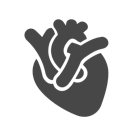On Friday nights, we circle our father’s chair for the blessing over the children. He rests a heavy hand on our heads, spills familiar Hebrew words—May you be like Sarah, Rebecca, Rachel, and Leah—then we run around the long Sabbath table, forcing him to give chase. He does (he could, back then) and lands quick kisses on our cheeks.
• • •
I have my first kiss while sinking into cold sand in the shadow of the Ventnor City boardwalk. I’m six years old and wear an oversized casino shirt that doubles as a dress. That house on the beach had the gold shag carpet where I learned to walk and then danced to Polish lullabies on my grandfather’s toes and then twined the rubber cord of a rotary phone through preteen fingers.
• • •
My father’s labored breathing echoes down the split-level staircase. He trades the middle of his days for naps at high noon, sleeps on a black leather couch in the heart of the room, a cracked book, one of his mysteries, rising and falling on his chest as grandchildren swirl around.
• • •
When I move away from home, I frequent a coffee shop with egg-yellow walls along one of the city’s main arteries. I’m new to being in the world and caffeine is my drug of choice. I drink it strong. Dark. Often. Amid the din of other people’s days. Come middle of night, my heart flutters and races. I milk every hour for what it’s worth. I miss nothing.
• • •
The walls of my father’s lower chamber have thickened over time. Apical hypertrophic cardiomyopathy: a heart closing in on itself. He flies to the deep Midwest in the dead of summer to the one surgeon who would crack him open and carve away some of the growth. He was warned, though, it could always return.
• • •
On a dark February morning, I’m on my back in that lofted bed in the dorm room off Lincoln Field. The square-jawed sophomore is arched over me in a threadbare tee, telling of the time he sang to a dying pigeon on the side of the road. “I don’t want to scare you,” his words like a distant train whistle, “but I think I’m falling in love with you.” I no longer need sleep, only him. He is not Jewish. Not allowed. My mother has already threatened to mourn for me if we marry.
• • •
One day in April, the call comes that my father’s brother dropped dead on a golf course. We all get EKGs after that. In me, they find a functional murmur—subtle sounds caused not by defects in the heart itself, but by circumstances in its surroundings.
• • •
We take the sophomore’s old blue Volvo station wagon, a hand-me-down from his parents, to diners across the state line. We talk in aching tones about how we have to end this and I look across the table, hating the thought of him with anyone else. I order cheese fries and we draw on the backs of paper menus with kid crayons: stick figures, our childhood nicknames, maps of our family trees. A hieroglyphic of us.
• • •
My grandmother saw 95 before dying of congestive heart failure. You can live a long time with a broken heart.
• • •
We leave behind our forbidden love in a wood-paneled room on an early summer night. He wears a yellow raincoat, hands me a letter listing our memories. I hope we find our way back to each other, but I never say so and we never do.
• • •
I’d travel in trains down the coast—Linden, Edison, Hamilton—to boys I’d lie next to on cold campgrounds, kiss on the porch of a hostel in Crete, or in the copper fog of a New York City 3 a.m. and never see again.
• • •
Now I’ve found my way to the farmlands of Pennsylvania and I have this husband and this house. Four children. I fix dinners and buy tap shoes and take out the trash on Tuesdays. I get my heart checked every three years, lying on a table as the echo machine bares the contents of my chest.
• • •
Things look fine for now. But if you listen closely, you can hear a soft flutter, the clamor of all I’ve known or loved. The murmur that could be my quiet undoing in the end.

Dina L. Relles’ work has been/will be in matchbook, Monkeybicycle, Hobart, CHEAP POP, Passages North, DIAGRAM, and Wigleaf, among others. Her writing has been nominated for a Pushcart Prize and Best of the Net and selected for Best Microfiction 2019. She is the Nonfiction Editor at Pidgeonholes and an Assistant Prose Poetry Editor at Pithead Chapel. More at www.dinarelles.com or @DinaLRelles.
© 2019 Dina L. Relles. Published by LITTLE FICTION | BIG TRUTHS, August 2019.
Images from The Noun Project (credits: IcoLabs).

THE 2019 FLASH NONFICTION ISSUE:




































